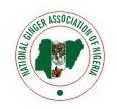Nigeria is a leading global producer of ginger, with a production capacity that significantly impacts the global spice market. In 2023, Nigeria produced approximately 1.5 million metric tons of ginger, ranking it among the top three producers in Africa, alongside India and China. The country's favorable climate and rich soil conditions provide an ideal environment for ginger cultivation, making Nigeria a key player in the global spice trade.
The global ginger market is witnessing robust growth, with a market size expected to reach USD 8.98 billion by 2032, up from USD 6.04 billion in 2023. This growth is driven by the increasing demand for ginger in various applications, including food and beverages, pharmaceuticals, and cosmetics.
Key importers of ginger include:
These countries offer significant opportunities for Nigerian ginger exporters, especially as consumer preferences shift towards natural and health-oriented products.
The global ginger market is competitive, with major players including:
India and China together hold over 60% of the global ginger market, while Nigeria’s market share is increasing due to enhanced production and export efforts.
Consumers are increasingly favoring natural and organic products. In major importing countries, surveys reveal a growing demand for:
Market research shows that 70% of consumers in the U.S. prefer products with natural ingredients, highlighting the potential for Nigerian ginger in health-focused markets.
Ginger prices have shown volatility, influenced by supply chain disruptions and changes in demand. Historical data indicates that the average price of ginger has fluctuated between $1.50 and $3.00 per kilogram over the past five years. Prices are projected to stabilize as global demand continues to rise.
Quality inconsistencies are a significant barrier for Nigerian ginger exporters. Up to 30% of ginger exports face rejection due to issues such as:
Nigerian ginger production is hampered by supply chain inefficiencies. Despite the potential to produce over 2 million metric tons, logistical challenges and inadequate infrastructure limit export volumes.
The absence of standardized grading systems contributes to quality inconsistencies. Implementing grading systems could improve market access and reduce rejection rates in international markets.
Transportation costs significantly impact the competitiveness of Nigerian ginger. Logistics costs can account for up to 20% of the total export price, due to:
Creating a strong brand identity is crucial for Nigerian ginger exporters. A compelling value proposition that highlights the unique qualities of Nigerian ginger, such as its flavor profile and health benefits, can differentiate it in the competitive market.
NGAN programs can help you establish a strong brand as a ginger export business. We have workshops, services and groups to help you in this regard.
A unique selling proposition should emphasize the distinctive characteristics of Nigerian ginger, including:
Effective packaging and labeling are essential for market acceptance. Compliance with international standards includes:
Establishing trust with international buyers is critical for long-term success. Strategies include:
Implementing best practices in ginger cultivation can enhance productivity and yield. Extension services can provide farmers with training on modern farming techniques, pest management, and soil health.
Achieving GAP certification can improve the quality and marketability of Nigerian ginger, promoting sustainable farming practices.
Investing in processing facilities for drying, grinding, and packaging can add value to ginger products and extend their shelf life.
Exploring value-added ginger products, such as ginger powder, ginger oil, and ginger-infused beverages, can open new markets and increase revenue streams for Nigerian exporters.
Efficient harvesting and post-harvest handling practices can reduce losses and improve product quality. Proper storage facilities can extend the shelf life of ginger.
Reliable logistics infrastructure is essential for timely delivery and cost-effectiveness. Developing transportation networks and cold chain systems can enhance the efficiency of ginger exports.
Optimizing logistics operations can significantly reduce costs. Strategies include:
Ensuring timely delivery and compliance with import regulations is critical for maintaining buyer relationships. Proper shipping documentation and customs clearance processes can facilitate smooth exports.
The Nigerian government plays a crucial role in promoting ginger exports through various export promotion policies. Initiatives aimed at enhancing agricultural productivity and market access can support the growth of the ginger export sector.
The government can provide financial incentives, such as export credits and grants, to support ginger exporters. These programs can help mitigate risks and encourage investment in the sector.
Engaging in trade negotiations to reduce tariffs and improve market access for Nigerian ginger is essential. Free Trade Agreements (FTAs) can enhance competitiveness in target markets.
Compliance with SPS measures is critical for accessing international markets. Ensuring that Nigerian ginger meets international quality and safety standards can facilitate smoother exports.
Building strong export markets for Nigerian ginger presents significant opportunities for economic growth and development. By addressing the challenges faced by ginger exporters and implementing strategic initiatives, Nigeria can enhance its position in the global ginger market.
Key recommendations for further development of the ginger export sector include:
Collaboration among stakeholders, including the government, exporters, farmers, and associations, is essential to drive growth in the ginger export sector. Together, we can unlock the full potential of Nigerian ginger in the global market.
